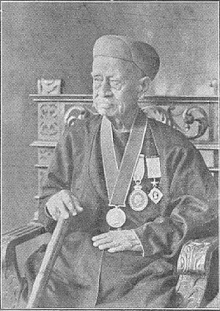Raganath Rao
Bahadur Raganath Rao was the premier of a Maratha state. His names are alternately spelled "Raghunath" and "Row," and "Bahadur" is a title meaning "brave" or "most honorable." He was a very active and esteemed member of the early Theosophical Society.
Raghunatha Rao was born to a prominent Deshastha Brahmin family on February 7, 1831. Even though his people were Marathi, from the west-central Indian state of Maharashtra, he was born in Kumbakonam, in the southeastern state of Tamil Nadu, and lived in various parts of India. He was well-educated, with a Bachelor of Arts degree, and worked as a translator and a Deputy Collector before he was called to higher offices by the Rajah of Indore. During much of his life, he worked for reforms and for Indian independence. He died on May 3, 1912.
Involvement with Theosophical Society
The beginning of Rao's interest in the Theosophical Society is not known, but in November 1886 he served as the chairman at a lecture by Colonel Olcott before the Triplicane Juvenile Association at the house of Rajah Ishwaru Dass, Triplicane, Madras. The topic was "The Duties of Aryan Youth to Themselves and to Their Country," and was well received. Then Raganath Rao spoke, in an account printed in the Indian Mirror:
He eulogized in the warmest terms the founders of the Theosophical Society and the work of the Society itself. No one, he said, could fail to be struck with the results actually achieved within the short space of six or seven years; it was a perfect miracle. He, the Chairman, firmly believed that the hand of God was constantly guiding human affairs, and he saw that Divine guidance displayed in this Society's work. Christian friends of India had for many years been laboring to awaken the religious spirit in our country-men, and had spent millions of pounds sterling in this end, in the way they thought the best. yet what had they accomplished? We need only glance at what India was six years ago to see that scarcely anything had been effected. But here are two foreigners who come here without any of those advantages, and arouse the soul of the whole people of India; doing more in six years than any other reformers had done in sixty or six hundred. Perhaps, one reason for this was that the others had had their interested motives, they wanted to accomplish a purpose interesting or important to themselves, while these two real friends of India had nothing to gain but the accomplishment of duty to all mankind...
He had sat quietly, while Colonel Olcott was clearly laying down the duties of Aryan youth, and showing how they might attain the highest happiness for themselves and prosperity for India, and had gone through a wonderful experience. As the Colonel was forming his ideas into English sentences, the speaker [Rao] saw mentally flashing past his consciousness the self-same ideas as they are written in Sanskrit in our Shastras. The very words of Manu, our great Lawgiver and Rishi and those of the author of the Bhagwatgita, were being spoken by the mouth of this American brother! This was something like a miracle, was it not? How comes it that this gentleman, for whom Sanskrit is a sealed book, talks the doctrines of our sages, as preserved in our holy language? He, the speaker, had an easy explanation; the same God who inspired our scriptures was inspiring the Colonel to utter these truths, abd our thanksgiving should be raised to Him for sending us friends in the darkest hour of our necessity. [Great and long continued applause, and cheers for the Theosophical Society and its founders.] - Indian Mirror[1]
Charles Johnston described him in this way after a social visit with T. Subba Row and others in 1888:
Ragunath Rao, short and supple, was a man of power, and with power’s finest efflorescence, a warm and cordial sense of humor; his eyes were bright blue, a thing rare among natives of India, but now and then found among the best Brahmans of the Mahratta country or Kashmir.[2]
His high esteem within the Theosophical Society is reflected in The Theosophist of December, 1886:
DEWAN BAHADUR R. RAGHUNATHA ROW
The Executive Council of the Theosophical Society is about losing the services of one of its most important members, by the removal of Dewan Bahadur R. Raghunatha Row to Indore, of which great Fendatory Raj he has been appointed Prime Minister by H. H. the Holkar Maharajah. The selection of our eminent colleague for this high office is a most judicious one for the Prince, because of the Dewan Bahadur’s patriotic sympathies, religious earnestness, and well recognized probity of character and able statesmanship. The Indian press have unanimously expressed their pleasure, and there is but ono opinion as to his fitness for the Dewanship of Indore, which office, in fact, he held from 1875 to the close of 1879. How deep an interest he takes in our Society was seen in the report – copied into last month’s Theosophist, from the Indian Mirror – of his address at Col. Olcott’s recent lecture at Triplicane. By his request he will be continued as a non-resident member of the Executive Council and another resident gentleman be added.[3]
He was still an active TS member in his later years. In 1905, he was a founder and first president of the Chitaldrug Branch of the T. S. in Mysore State.[4]
Notes
- ↑ "The Duties of Aryan Youth to Themselves and to Their Country" Supplement to The Theosophist 8 (November, 1886): v-vi. The article was quoting the Indian Mirror.
- ↑ Charles Johnston, "East and West" The Atlantic (March, 1912): 325.
- ↑ "Dewan Bahadur R. Raghunatha Row" Supplement to The Theosophist 8 no. 87 (December 1886): ix.
- ↑ Updendranath Basu, "India" Supplement to The Theosophist 26 (1905): xxxi.
